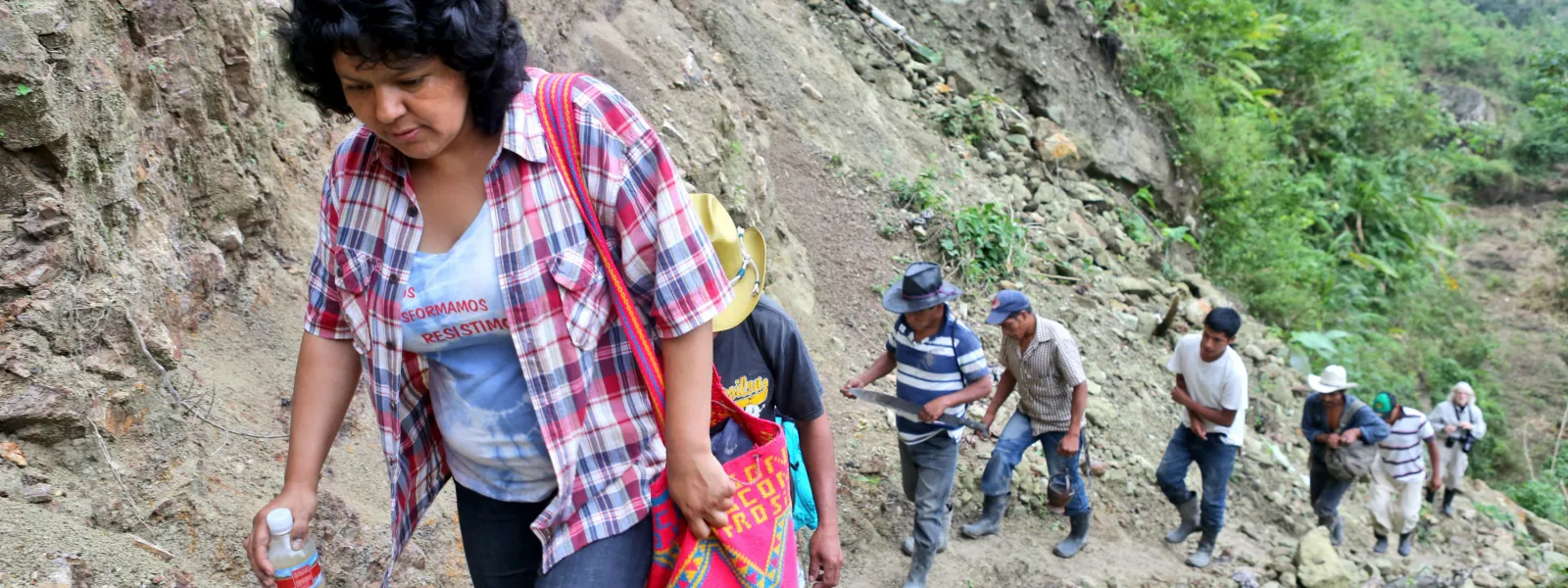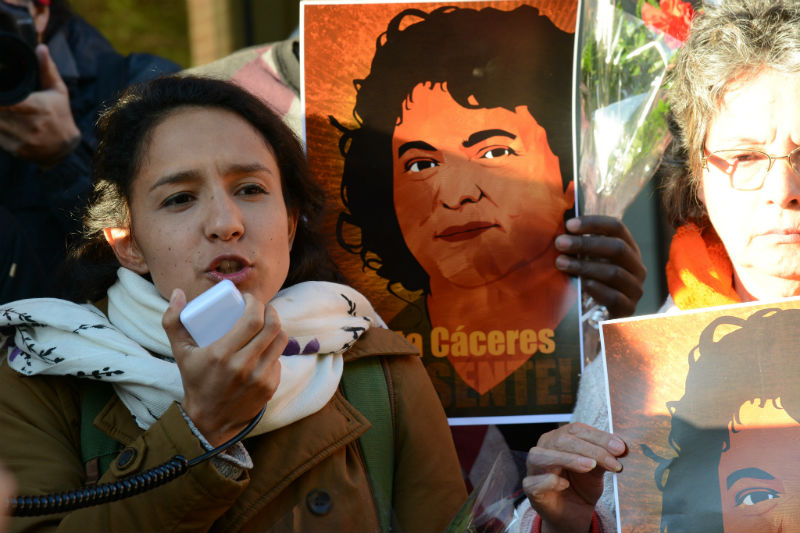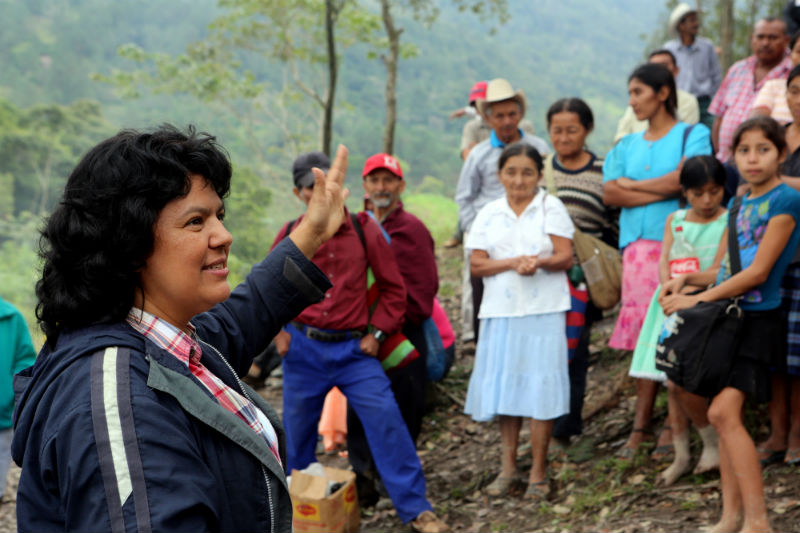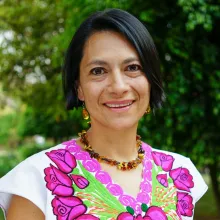
Losing Berta Cáceres: the breaking point in the struggle against impunity
Photo: Goldman PrizeIt’s been one month since the assassination of Berta Cáceres, tireless defender of the environment and human rights in Honduras. Her murder quickly gave birth to a global movement calling for justice. It has become a turning point for human rights and environmental defenders and, especially, in the fight for the rights of women and indigenous peoples in Latin America. For that, March 3 will never be forgotten.
There aren’t enough words to describe adequately who Berta was, and who she will always be in our memories. She represented what it meant to be a woman, an indigenous person, an environmentalist, a mother, a daughter, a sister, a colleague and a friend. As the BBC said, she’s the Honduran woman who twisted the arm of China and the World Bank; her work led to the withdrawal of their funding for Agua Zarca, the dam Berta was so passionately fighting against.
For all that she did, and all that she was, the loss of Berta has severely hurt us all. In a matter of hours, her death caused an unprecedented global outcry. Thousands of organizations, institutions and individuals from around the world have been speaking out against her murder and loudly demanding justice.

Point of no return
Ironically, the night Berta was murdered, I watched Selma, a film that narrates a key moment in the Civil Rights Movement. Fifty-one years ago, on March 7, 1965, a voting rights march that left Selma toward Montgomery, Alabama was violently repressed. That senseless act of violence became the catalyst for the passage of the Voting Rights Act, which aimed to overcome legal barriers that prevented African Americans from exercising their right to vote.
Similarly, we must make Berta’s murder the catalyst that breaks the systematic impunity of cases like this, in Honduras and throughout the region. It’s time to ensure that our indignation, and the demands for justice and investigation made by countless organizations and international authorities, will have an impact.
Like Alabama in 1965, Honduras has endured years of systematic human rights violations, linked in large part to infrastructure and mining projects. Just days before her death, Berta and COPINH, the organization she directed, reported threats received for their opposition to the Agua Zarca Dam project. It had been years since the Inter-American Commission on Human Rights first granted precautionary measures to protect Berta’s life, with which the Honduran government failed to comply.

After Berta’s murder, on March 5, due to the gravity of the situation the Commission authorized precautionary measures to protect Berta’s family, her colleagues at COPINH, and Gustavo Castro, the sole witness to her death. But days later Néstor García, another member of COPINH, was also assassinated. Then, Gustavo was prevented from returning home to Mexico despite cooperating with the investigation, and despite his ability to continue doing so under the Treaty of Judicial Cooperation between Mexico and Honduras. Members of COPINH and Berta’s relatives continue to report new threats.
Many international officials—including the Organization of American States, the Office of the United Nations High Commissioner for Human Rights, UN special rapporteurs, and members of the Congresses of the United States, Costa Rica and the European Union—have also demanded an objective investigation into Berta’s murder. Despite public outcry, little progress has been made thus far, evidenced by the lack of response from the Honduran government and conclusions drawn by an international observation mission.
The situation in Honduras reflects the alarming reality of human rights in Latin America, particularly there and in Brazil, Colombia, Mexico and Peru. Multiple reports conclude that the region is under fire. Those who fight to protect their rights, their land, and the environment are risking their freedom, their integrity, and even their lives.

Irresponsible businesses and financing
Berta’s murder also underscores the responsibility of companies, financial institutions and others involved in the Agua Zarca Dam project. The project’s outright threats to the environment and human rights have been reported for many years. Those threats are the reason the World Bank and Sinohydro pulled out of the project in 2014. The FMO of Holland and Finn Fund of Finland also withdrew their support on March 16, after the assassination of Néstor García. The Central American Bank for Economic Integration (CABEI) froze funding to the project a few days ago.
The situation surrounding Berta’s death clearly demonstrates one reason large dams are a bad energy solution—they create severe socioenvironmental impacts. Honduras, like the rest of Latin America, has options to produce energy in ways that truly promote development and reduce poverty. It’s time to learn from the mistakes of the past and move into the 21st century by implementing sustainable energy alternatives.
The shocking loss of Berta, the uncertain situation of Gustavo and members of COPINH… it all reminds me of the words of a friend, a journalist who was driven out of his own country for what he wrote. He said that extractive industries, including large dams, are the banana republics of our century. I think he’s right.
In Latin America, the uncontrolled extraction of natural resources today is akin to the reign of dictators in the 1960s. We cannot afford to let this happen again.
This time will be different. What happened in Honduras must be a watershed moment—a time, finally, to enforce international standards for human rights and the environment.
In Berta’s case, there must be an immediate, effective and independent investigation. It should acknowledge the responsibility of the companies involved with Agua Zarca. The hydroelectric project itself should be analyzed to find suitable alternatives. Honduras and all the States involved should implement corrective measures to ensure that what happened to Berta and Néstor does not happen again.
Those of us who worked with Berta, who share her passions and principles, will continue to demand justice. Every country in the Americas needs and deserves it.
Astrid Puentes

Astrid Puentes Riaño was one of the two Co-Executive Directors of AIDA (2003-2021). She was responsible for AIDA’s legal efforts and organizational management. Originally from Colombia, Astrid has significant experience linking environmental protection with human rights, and climate change, highlighting the importance to prioritize climate justice. For over twenty years she has been working on public interest litigation, especially in the field of human rights, the environment, and climate change. Astrid holds an LL.M. in Comparative Law from the University of Florida, a Masters in Environmental Law from the University of the Basque Country, and a J.D. from the Universidad de Los Andes, Colombia. Astrid has also taught several seminars and classes on human rights, the environment and climate change, including at American University Law School in Washington, and the Universidad Nacional Autónoma de México (UNAM).
